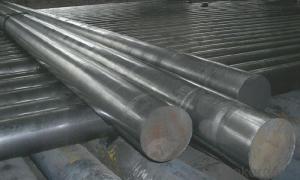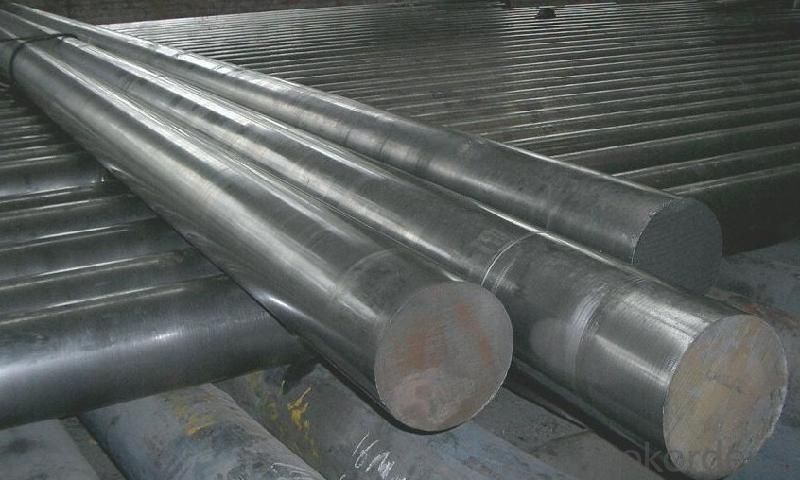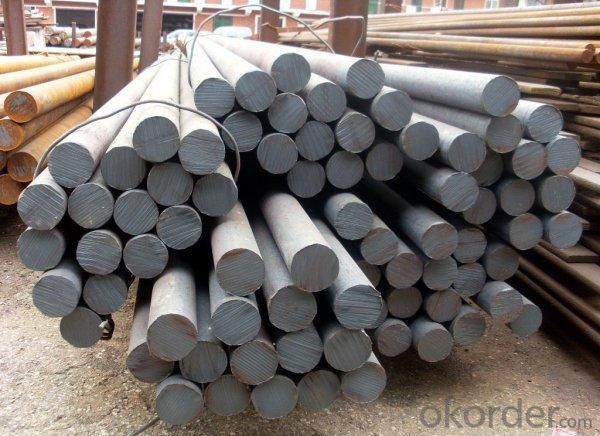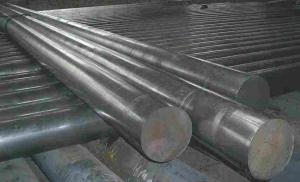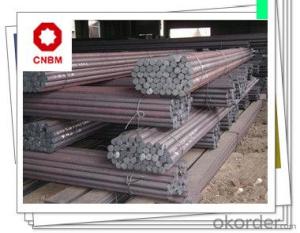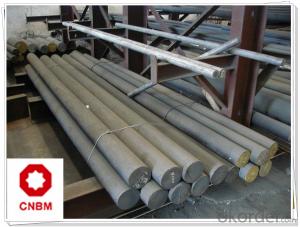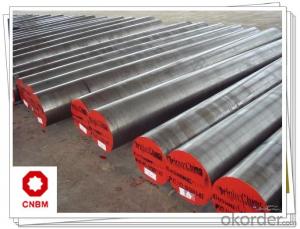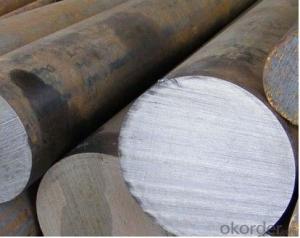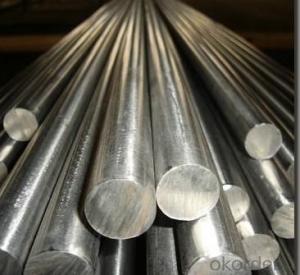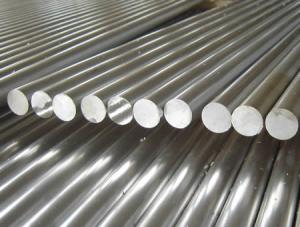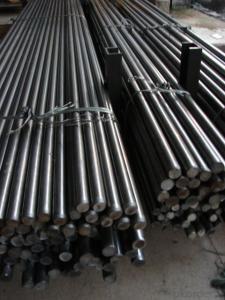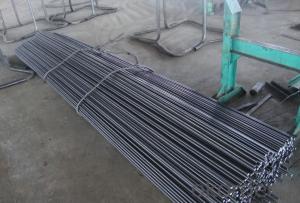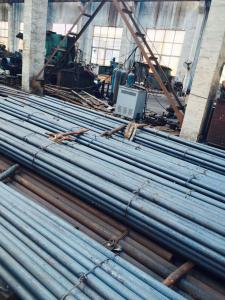Cold Drawn Steel Round Bar with High Quality-100mm
- Loading Port:
- China Main Port
- Payment Terms:
- TT or LC
- Min Order Qty:
- 100 m.t
- Supply Capability:
- 10000 m.t/month
OKorder Service Pledge
OKorder Financial Service
You Might Also Like
Cold Drawn Steel Round Bar with High Quality-100mm
Specifications:
1.Size: 100mm
2.Material: AISI 1045/DIN 1.1191/JIS S45C/GB 45/EN8.
3.Chemical analysis:
C | Si | Mn | P≤ | S≤ | Cr |
0.40~0.60 | 0.20~0.30 | 0.70~0.90 | 0.030 | 0.030 | 0.01~0.03 |
4.Process: EAF + LF + VD + Forged + Heat Treatment (optional)
5.Delivery condition:Hot forged +Rough machined (black surface after Q/T)+ Turned (optional)
6.Technical Data: Chemical Composition, Physical Properties and Mechanical Testing.
7. Test: Ultrasonic test according to SEP 1921-84 3C/c.
8. Standard: GB, AISI, ASTM, DIN, JIS, BS, etc.
9. Quality Management Certification: ISO 9001:2008.
10. Main application:
(1)It is widely used in machinery manufacturing.
(2) For the manufacture of high strength requirements parts, such as gears, shafts, piston pin and the uneven force big machining parts, forgings, stampings and bolts, nuts, pipe joint.
FAQ of Cold Drawn Steel Round Bar with High Quality-100mm:
Q1: How soon can we receive the product after purchasement?
A1: Within three days of placing an order, we will begin production. The specific shipping date is dependent upon international and government factors, but is typically one month.
Q2: How do you guarantee the quality of our products?
A2: We have established an advanced quality management system which conducts strict quality tests at every step, from raw materials to the final product. At the same time, we provide extensive follow-up service assurances as required.
Q3: The prices are invoicing on theoritical weight or on actual weight?
A3: We can do it in both manners, according to the customers' request.
Images of Cold Drawn Steel Round Bar with High Quality-100mm:
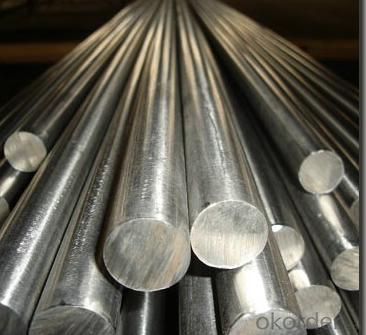
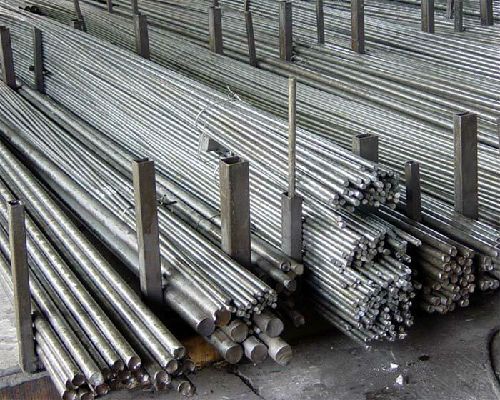
- Q: What are the environmental benefits of using steel round bars?
- There are several environmental benefits of using steel round bars: 1. Recyclability: Steel is one of the most recycled materials in the world. Using steel round bars reduces the demand for new steel production and saves energy and resources. Additionally, recycling steel reduces the amount of waste sent to landfills, helping to reduce environmental pollution. 2. Durability: Steel round bars are highly durable and have a long lifespan. This means that they do not need to be replaced frequently, reducing the overall consumption of materials. The durability of steel also reduces the need for maintenance and repairs, further reducing environmental impact. 3. Energy efficiency: Producing steel round bars requires less energy compared to other construction materials like concrete or wood. The energy savings are significant throughout the entire life cycle of the product, including extraction, manufacturing, transportation, and installation. 4. Reduced carbon emissions: Steel production emits less carbon dioxide (CO2) compared to other materials. By using steel round bars, we can help reduce greenhouse gas emissions and combat climate change. Furthermore, steel can be produced using alternative energy sources, such as renewable energy, further reducing carbon emissions. 5. Versatility and weight reduction: Steel round bars are versatile and can be used in various construction applications. Their high strength-to-weight ratio allows for the creation of lightweight structures, reducing the amount of material needed. This not only lowers the environmental impact but also decreases transportation costs and fuel consumption during delivery. 6. Fire-resistant properties: Steel round bars are highly resistant to fire, which can help prevent the spread of flames and reduce damage to structures. This property reduces the need for fire retardant chemicals that may have negative environmental impacts. In conclusion, using steel round bars offers numerous environmental benefits, including recyclability, durability, energy efficiency, reduced carbon emissions, weight reduction, and fire resistance. By opting for steel round bars, we can contribute to a more sustainable and eco-friendly construction industry.
- Q: What is the tolerance for diameter in steel round bars?
- The tolerance for diameter in steel round bars can vary depending on the specific application and industry standards. However, in general, the tolerance for diameter in steel round bars typically ranges from +/- 0.005 inches to +/- 0.010 inches.
- Q: What are the chemical composition requirements for steel round bars?
- Steel round bars can have different chemical composition requirements depending on the specific grade or type of steel. Generally, carbon steel, alloy steel, and stainless steel are commonly used for making these bars. Carbon steel round bars consist mainly of iron and carbon, with small amounts of other elements like manganese, phosphorus, sulfur, and silicon. The carbon content can range from 0.08% to 2.1%, depending on the desired strength and hardness. These bars find widespread use in construction, manufacturing, and general-purpose applications. Alloy steel round bars contain additional alloying elements such as chromium, nickel, molybdenum, vanadium, and manganese. These elements are added to improve the mechanical properties of the steel, including strength, hardness, and resistance to wear and corrosion. The specific chemical composition requirements for alloy steel round bars can vary significantly depending on the desired properties and the specific alloy used. Stainless steel round bars are primarily composed of iron, chromium, and nickel, with smaller amounts of other elements like carbon, manganese, and molybdenum. The high chromium content provides excellent corrosion resistance, while the nickel content enhances strength and ductility. The chemical composition requirements for stainless steel round bars are typically specified by international standards such as ASTM or EN, which define the minimum and maximum allowable percentages of each element. In conclusion, the chemical composition requirements for steel round bars depend on the specific grade or type of steel being used, with carbon steel, alloy steel, and stainless steel being the most common types. The composition of these bars is carefully controlled to achieve the desired mechanical properties and performance characteristics for various applications.
- Q: What are steel round bars?
- Steel round bars are cylindrical metal rods made from steel that are typically used in construction, manufacturing, and engineering applications. They have a circular cross-section and are known for their strength, durability, and versatility. These bars are commonly used to provide structural support, reinforcement, or as machined components in a wide range of industries.
- Q: How do steel round bars compare to other materials like aluminum or stainless steel?
- Steel round bars have several advantages over other materials like aluminum or stainless steel. Firstly, steel is known for its exceptional strength and durability, making it a preferred choice for applications that require high tensile strength. Compared to aluminum, steel round bars are generally stronger and have a higher resistance to impact and wear. Additionally, steel is more cost-effective than stainless steel, making it a popular choice for various industrial and construction purposes. However, it's important to note that stainless steel offers superior corrosion resistance, making it more suitable for applications where exposure to moisture or chemicals is a concern. Ultimately, the choice between steel round bars, aluminum, or stainless steel depends on the specific requirements of the project.
- Q: Can steel round bars be used for making crankshafts?
- Crankshafts can be made using steel round bars, which are known for their high strength, durability, and ability to withstand the stress and load of engine operation. Steel is a preferred material for crankshafts because it provides a solid and reliable foundation for the rotating assembly. The round shape of the bars allows for easy machining and shaping to achieve the desired crankshaft design. Furthermore, steel can be heat-treated to improve its mechanical properties, including hardness and fatigue resistance, making it perfect for the demanding conditions and high-performance needs of crankshafts in different engine applications.
- Q: What is the difference between a solid and a hollow steel round bar?
- A cylindrical bar made entirely of solid steel material is called a solid steel round bar. It is completely filled and does not have any empty spaces inside. On the other hand, a hollow steel round bar is also cylindrical but has a hollow center, meaning there is empty space or a void within the bar. The primary distinction between a solid and a hollow steel round bar is their structural composition and the roles they fulfill. A solid steel round bar is typically used in applications where strength and durability are of utmost importance. It is commonly employed in construction, manufacturing, and engineering projects that require load-bearing capacity. Conversely, a hollow steel round bar is designed to be lighter in weight while still maintaining structural integrity. The hollow center allows for weight reduction while still providing sufficient strength for various applications. Hollow steel round bars are often utilized in industries such as aerospace, automotive, and marine, where reducing weight is crucial for enhanced fuel efficiency and overall performance. Furthermore, the empty space inside a hollow steel round bar also presents an opportunity for customization. It can be utilized to house other components, such as wires or piping, enabling a more streamlined and efficient design. This versatility makes hollow steel round bars suitable for various applications that necessitate both strength and weight reduction. In conclusion, the main difference between a solid and a hollow steel round bar lies in their structural composition and the roles they fulfill. Solid steel round bars are employed in applications that demand maximum strength and durability, while hollow steel round bars offer weight reduction and customization options, making them suitable for applications that prioritize lightweight design without compromising structural integrity.
- Q: Are steel round bars suitable for marine environments?
- Yes, steel round bars can be suitable for marine environments, but it depends on the specific type of steel used and the conditions of the marine environment. Stainless steel is often the preferred choice for marine applications due to its excellent corrosion resistance properties. Stainless steel contains chromium, which forms a protective layer on the surface of the steel, preventing corrosion and rusting. However, not all steel round bars are suitable for marine environments. Carbon steel, for example, is more susceptible to corrosion in marine environments, especially in the presence of saltwater. Carbon steel should be carefully protected with coatings or treatments to prevent corrosion. Additionally, the conditions of the marine environment also play a significant role in determining the suitability of steel round bars. Factors such as the salinity of the water, exposure to chemicals, temperature variations, and physical stress can affect the corrosion resistance of steel. In highly corrosive marine environments, it is advisable to use specialized marine-grade stainless steel or other corrosion-resistant alloys. Ultimately, it is crucial to select the appropriate grade of steel and consider additional protective measures, such as coatings or galvanization, to enhance the durability and longevity of steel round bars in marine environments.
- Q: What is the difference between a ground and a polished steel round bar?
- A ground steel round bar and a polished steel round bar differ in their surface finish and appearance. A ground steel round bar is subjected to a grinding process, where a grinding wheel or belt is used to remove any surface imperfections, such as roughness or irregularities. This process results in a smooth and even surface finish. Ground steel round bars are often used in applications where precision and tight tolerances are required, such as in machinery or automotive components. On the other hand, a polished steel round bar undergoes a polishing process, where abrasive materials such as polishing compounds or buffing wheels are used to create a high shine and reflective surface. This process enhances the aesthetics of the steel bar, making it more visually appealing. Polished steel round bars are commonly used in decorative applications, architectural projects, or in industries where a visually pleasing appearance is desired, such as jewelry or interior design. In summary, while both ground and polished steel round bars serve different purposes, the main difference lies in their surface finish. Ground steel round bars prioritize precision and smoothness, while polished steel round bars prioritize a shiny and reflective appearance.
- Q: What are the advantages of using molybdenum-alloy steel round bars?
- Using molybdenum-alloy steel round bars in various applications provides several benefits. To begin with, the inclusion of molybdenum elevates the steel's strength and hardness, making it an optimal selection for industries that necessitate robust materials. By enhancing resistance to deformation under heavy loads, the addition of molybdenum increases the durability and longevity of the round bars. Additionally, molybdenum-alloy steel round bars exhibit exceptional heat resistance properties. Consequently, they are well-suited for applications involving high temperatures, such as the production of heat exchangers, boilers, and furnace components. The steel's capacity to endure extreme temperatures without compromising its strength and structural integrity is a significant advantage. Another advantage is the corrosion resistance provided by molybdenum. Molybdenum-alloy steel round bars demonstrate superior resistance to corrosion in diverse environments, including acidic and alkaline conditions. This makes them an optimal choice for corrosive industries like chemical processing, oil and gas, and marine environments. Moreover, molybdenum-alloy steel round bars offer excellent weldability and machinability. The molybdenum content ensures that the steel maintains its structural integrity during welding and machining processes, minimizing the risk of cracks or deformations. This ease of fabrication allows for greater flexibility in design and construction. Furthermore, molybdenum-alloy steel round bars possess good wear resistance, rendering them suitable for applications involving abrasive conditions. Their ability to withstand wear and tear ensures an extended service life, thereby reducing maintenance and replacement costs. In conclusion, the utilization of molybdenum-alloy steel round bars yields advantages such as increased strength, heat resistance, corrosion resistance, weldability, machinability, and wear resistance. These properties establish them as the preferred choice in various industries, where durability, reliability, and performance are of utmost importance.
Send your message to us
Cold Drawn Steel Round Bar with High Quality-100mm
- Loading Port:
- China Main Port
- Payment Terms:
- TT or LC
- Min Order Qty:
- 100 m.t
- Supply Capability:
- 10000 m.t/month
OKorder Service Pledge
OKorder Financial Service
Similar products
Hot products
Hot Searches
Related keywords
